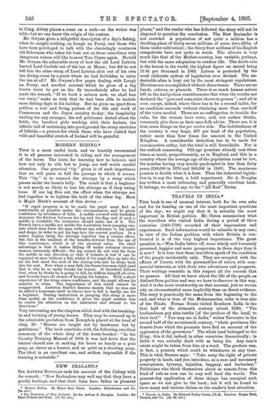NEW ZEALAND4
Sm. ARTHUR DOUGLAS ends his account of the Colony with the remark : "New Zealanders may well say that they have a goodly heritage, and that their lines have fallen in pleasant • Modern Biding By Major Noel Birch. London: Hutchinson and Co. [6s. net.] i The Dominion of New Zealand. By Sir Arthur P. Douglas. London: Sir UR= Pitman and Sons. [7s. 6d. net.] places," and the reader who has followed the story will not be disposed to question the conclusion. The New Zealander is not crowded. A population of not quite a million has a dwelling-place of thirty-seven millions of acres (two-fifths of them under cultivation) ; the thirty-four millions of his English compatriots have not quite as much. The climate is very much like that of the Mother-country, less variable, perhaps, but with the same adaptation to outdoor life. The death-rate is the lowest in the world, the highest figure on record being 11-45 per thousand in 1883. Labour is protected by the most elaborate system of legislation ever devised. The un- desirable alien is kept out by the most stringent regulations. Elections are accomplished without disturbance. There are no bands, colours, or placards. There is so much human nature left in the Antipodean constituencies that when the results are declared the "pros and cons raise cheers or groans "; and all is over, except, indeed, where there has to be a second ballot, for no candidate succeeds without obtaining more than one-half of the votes needed. There are no suffragettes to trouble the calm, for the women have votes, and, our author thinks, commonly give them as their men-folk advise. There are, it is true, some things on the per contra side. The indebtedness of the country is very large, 267 per head of the population, rather more than four times the amount in the United Kingdom. A considerable deduction has to be made for remunerative outlay, but the total is still formidable. Nor is the outlook reassuring. Old-age pensions already cost three times as much, proportionately, as in England, and this in a country where the average age of the population must be low, the number having very nearly quadrupled in less than forty years (248,000 in 1870 and 960,000 in 1908). The maximum pension is double what it is here. Thus the industrial legisla- tion is, to say the least, a bold experiment. Sir A. Douglas has written a most informing and generally excellent book. It belongs, we should say, to the "All Red" Series.






































 Previous page
Previous page